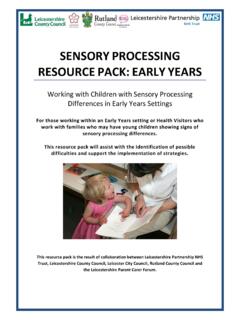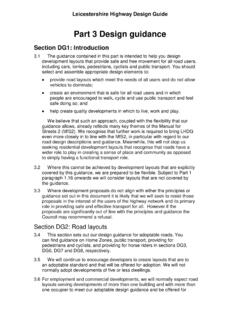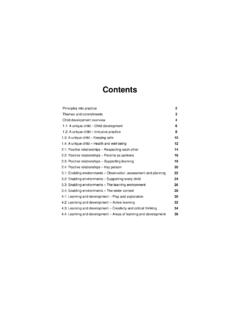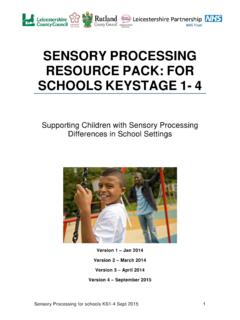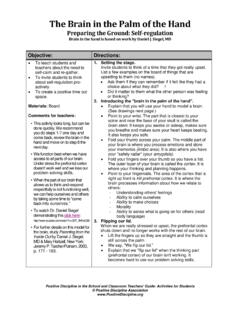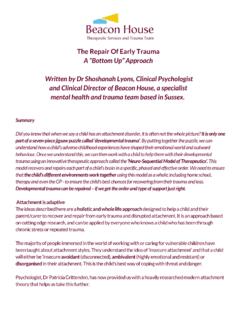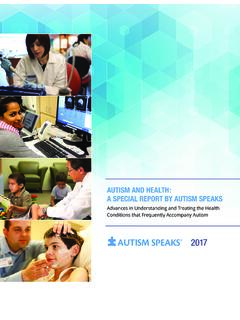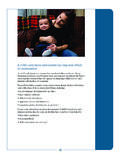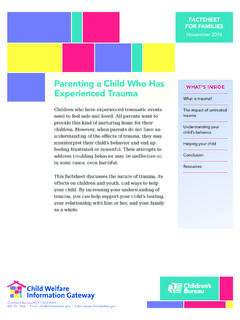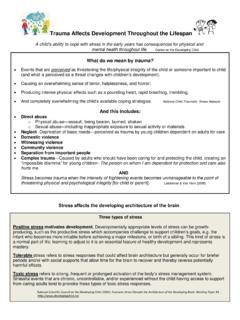Transcription of Solihull Approach Early Years
1 Solihull Approach Early Years Solihull Approach The Child Psychotherapy Trust 1999 states that: The first few months and Years of life are a sensitive period when children develop attachments and learn about emotions and social interactions in their family. This lays the foundations for future social, emotional and cognitive development. Children who do not have secure relationships Early in life are at greater risk of significant mental health problems, education difficulties or conduct disorders.'. Solihull Approach 2. How the Solihull Approach developed Motivated by health visitors reviewing practice began in 1996. Joint venture with psychotherapy, psychology and health visiting Bottom up Approach with managerial support Developed by different professional groups working together Training of health visitors in Solihull Supported by research specific projects Theoretical framework gradually developed Developed into open learning resource in 2001.
2 Evolves with professional practice Model used by other professional groups working with children and their families Requests for training from professionals nationally Solihull Approach 3. Ice Breaker A-Z childcare In your groups use the flipchart paper and pens to write your own A-Z of childcare! Each word must be something associated with the sector or your daily roles. Solihull Approach The Solihull Approach Model Supporting Relationships to Improve Outcomes Psychoanalytic theory (Bion). Child Development Behaviourism (Skinner). research (Brazelton). Solihull Approach 5. brain development Develops last. Logic, planning and cognition . We edit and adapt our impulsive reactions. Cortex is connected to the limbic system by the orbitofrontal cortex, receiving information from internal bodily Midbrain states and the external environment 33.
3 Controls appetite and sleep Alarm system especially amygdala - seat of impulse and emotions Develops first. Controls basic essential functions (blood pressure, temperature, heart rate). 6. Solihull Approach 6. Baby brain development and emotional health Solihull Approach 7. brain development and children's mental health Early experience determines which parts of the brain grow and which parts of the brain do not Memories of Early experiences, especially strongly emotional ones, are not dependent on conscious processes Early exposure to negative experiences abuse and neglect, limits long-term capacity to regulate feelings Good Early attachment to primary caregiver serves to promote resilience to later traumatic experiences Solihull Approach 8. DVD bit Solihull Approach The Solihull Approach Solihull Approach 10.
4 Definition of containment Containment is where a person receives and understands the emotional communication of another without being overwhelmed by it and communicates this back to the other person. This process can restore the ability to think in the other person. Solihull Approach 11. Physical containment Whenever I changed her nappy she would cry and wave her arms about. The more her arms moved, the more frantic her crying became. Eventually it occurred to me that she could have no idea what arms were, that they were attached to her, and that perhaps she was terrified by the feelings of insecurity and boundlessness. I began wrapping her shawl quite tightly round her and this seemed to calm her. I suppose it felt more like being held.'. The physical holding of a baby is important and may be the precursor to the experience of being mentally held.
5 Emotional containment Emotional containment is like feeling full of a problem, telling someone who listens and understands and then feeling the problem is in perspective, rather than going round and round in your head. The other person may not have said anything to help solve the problem but, by their attention and understanding, they have restored your ability to think about the problem, instead of feeling overwhelmed by it. Solihull Approach 12. The Solihull Approach Solihull Approach 13. Definition of reciprocity Reciprocity describes the sophisticated interaction between a baby and an adult where both are involved in the initiation, regulation and termination of the interaction. Reciprocity can also be used to describe the interaction within all relationships.
6 Solihull Approach 14. The Dance of reciprocity Peak of excitement Acceleration State of attention Deceleration Orientation Withdrawal or Initiation turning away 15. Solihull Approach 15. Rupture and repair Getting out of step in the dance (RUPTURE) but adjusting to get back into step (REPAIR) = Normal We experience that things can still get back on track Repeated rupture WITH Repeated rupture WITHOUT. repair repair Develop hope, optimism, Don't develop belief things get better, self self worth, self esteem, self worth, trust in esteem or trust in others others Good quality relationships ? Quality of relationships Solihull Approach 16. Activity parents/child perspectives On your table you will find a laminated card with a scenario on. Use your flipchart paper to think about how the person would feel going through this situation.
7 We will feed back after 5 minutes. Solihull Approach The Solihull Approach Solihull Approach 18. Definition of behaviour management Behaviour management is part of the ordinary process of normal development whereby parents teach their child self-control, thus enabling the child to participate in society. Parents in well- functioning families work together to place reasonable boundaries on the child's behaviour. They encourage the child with attention and other rewards. Gradually, the child becomes able to internalise both the restraints and the satisfactions for himself. It also facilitates learning and development. Solihull Approach 19. Behaviour management Sensitive and effective behaviour management is a product of containment and reciprocity therefore placed at the end of the process Customised to parent child relationship Solihull Approach 20.
8 Behaviour management and containment Behaviour management can be considered as another form of containment. Through the setting of clear boundaries, the parent is helping the infant to: Tolerate frustration To wait To learn that the child may not always be able to have what they want To share and not have sole possession of something Solihull Approach 21. Behaviour management and reciprocity Reciprocity is also part of behaviour management, in that different children will respond to different ways of being managed. The parents' understanding of their child and the child's interaction with them is important in successful behaviour management - thus it is important for the parents to be in tune with their child. So behaviour management is best done in the context of containing and reciprocal relationship Solihull Approach 22.
9 Case Study Mrs Perry On your tables you will find a case study entitled Mrs Perry'. Take some time to read through this case study and discuss how containment and reciprocity might affect the behaviour and the subsequent strategies used by a parent to deal with the behaviour. Solihull Approach Solihull Approach : Aim Increased quality of relationships Increased brain development Increased social skills Increased emotional regulation Decreased behaviour difficulties Leading to increased emotional health and well being Solihull Approach How does the model provide a way of supporting relationships from conception onwards? Relationships are at the heart of the model It is low cost so it can be used in times of austerity! It builds on people's current skills It is extending to cover all professional groups that work with children Solihull Approach How does the model provide a way of supporting relationships from conception onwards?
10 It covers both practitioners and parents It covers all age groups from antenatally to late adolescence The antenatal programme introduces the parents to their baby as well as covering pain and birth positions The face to face antenatal and parenting programme has been translated into an online course Solihull Approach Solihull Approach in different areas Training has been carried out in hundreds of areas of the UK, including Solihull , England, Scotland, Wales and N Ireland Large organised programme in Scotland All N Ireland health visitors being trained Small pilots internationally: Iceland, New York, Islamabad, Portugal, Turkey, Peru, Barbados, Gibraltar, Ghana Solihull Approach Across the workforce Solihull 2 day Foundation training for practitioners: for midwives and antenatal practitioners, health visitors, nursery nurses, school nurses, Children's Centres, teachers, for social work teams and fostering and adoption social workers, firefighters, prison staff Solihull Approach Across the workforce Group facilitation 1 day training - Antenatal parenting group - Postnatal group - Postnatal plus group - parenting group Refresher 1 day training Seminars - brain Development - Attachment - Understanding Trauma Solihull Approach Range of Resource Packs and Group Facilitation Manuals Solihull Approach Range of Training Manuals Solihull Approach Website for practitioners Solihull Approach Contact details Solihull Approach Email: Telephone: 0121 296 4448.

